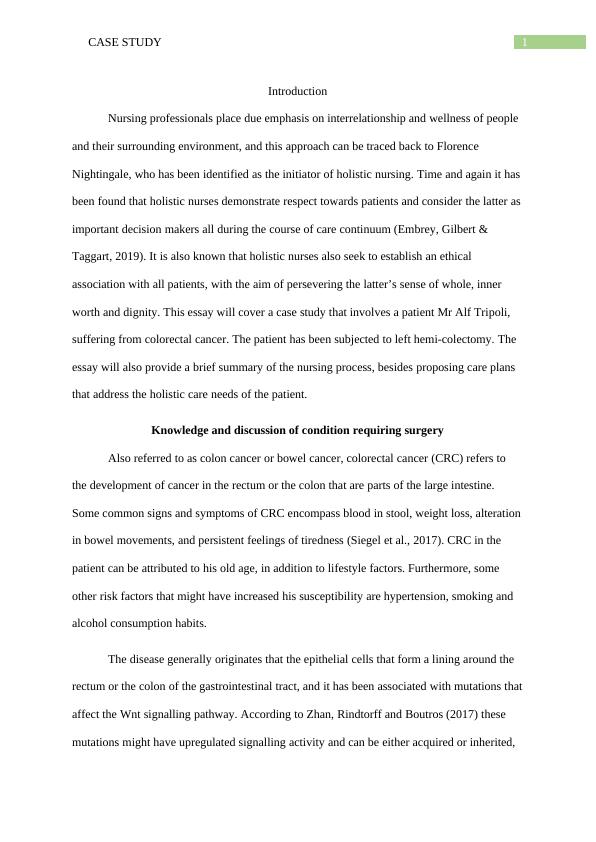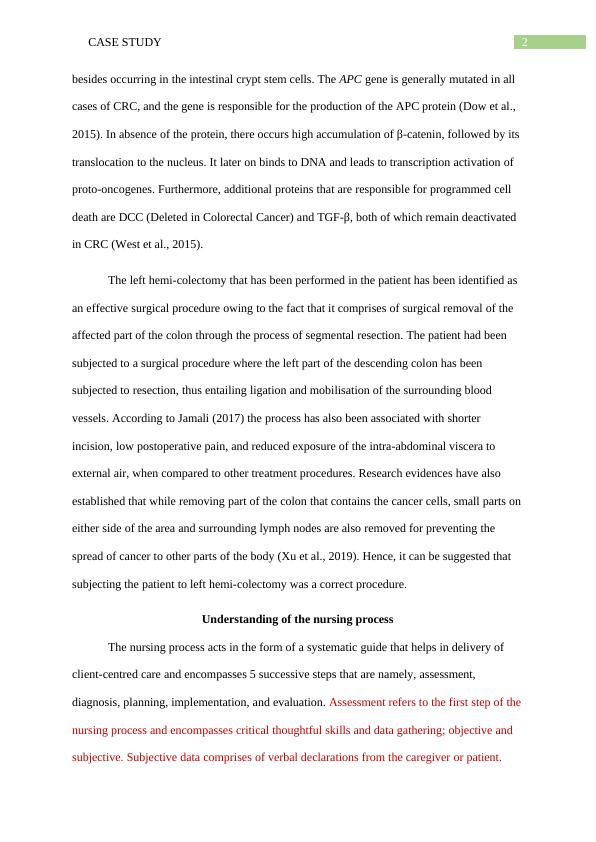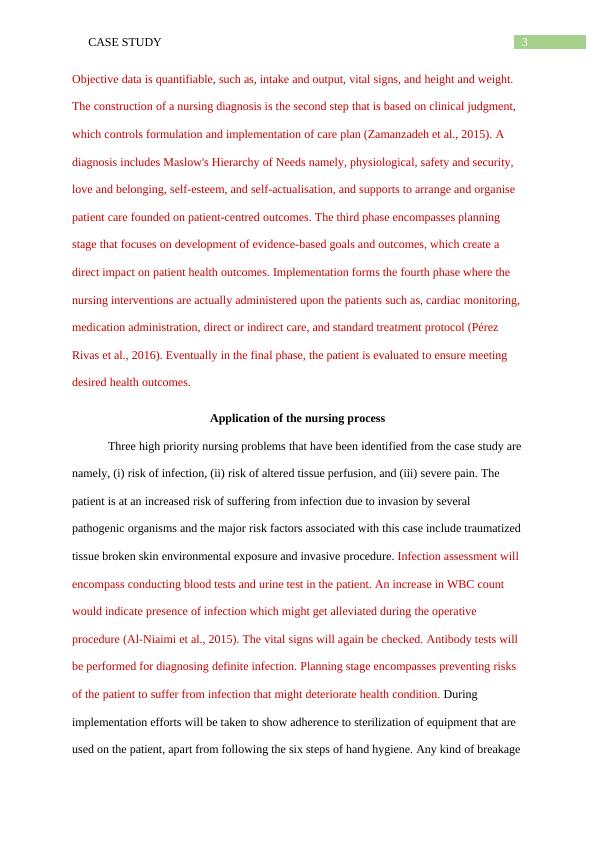Case Study - Colorectal Cancer: Nursing Process and Holistic Care
Added on 2022-11-13
12 Pages3804 Words337 Views
Running head: CASE STUDY
Case Study- Colorectal Cancer
Name of the Student
Name of the University
Author Note
Case Study- Colorectal Cancer
Name of the Student
Name of the University
Author Note

1CASE STUDY
Introduction
Nursing professionals place due emphasis on interrelationship and wellness of people
and their surrounding environment, and this approach can be traced back to Florence
Nightingale, who has been identified as the initiator of holistic nursing. Time and again it has
been found that holistic nurses demonstrate respect towards patients and consider the latter as
important decision makers all during the course of care continuum (Embrey, Gilbert &
Taggart, 2019). It is also known that holistic nurses also seek to establish an ethical
association with all patients, with the aim of persevering the latter’s sense of whole, inner
worth and dignity. This essay will cover a case study that involves a patient Mr Alf Tripoli,
suffering from colorectal cancer. The patient has been subjected to left hemi-colectomy. The
essay will also provide a brief summary of the nursing process, besides proposing care plans
that address the holistic care needs of the patient.
Knowledge and discussion of condition requiring surgery
Also referred to as colon cancer or bowel cancer, colorectal cancer (CRC) refers to
the development of cancer in the rectum or the colon that are parts of the large intestine.
Some common signs and symptoms of CRC encompass blood in stool, weight loss, alteration
in bowel movements, and persistent feelings of tiredness (Siegel et al., 2017). CRC in the
patient can be attributed to his old age, in addition to lifestyle factors. Furthermore, some
other risk factors that might have increased his susceptibility are hypertension, smoking and
alcohol consumption habits.
The disease generally originates that the epithelial cells that form a lining around the
rectum or the colon of the gastrointestinal tract, and it has been associated with mutations that
affect the Wnt signalling pathway. According to Zhan, Rindtorff and Boutros (2017) these
mutations might have upregulated signalling activity and can be either acquired or inherited,
Introduction
Nursing professionals place due emphasis on interrelationship and wellness of people
and their surrounding environment, and this approach can be traced back to Florence
Nightingale, who has been identified as the initiator of holistic nursing. Time and again it has
been found that holistic nurses demonstrate respect towards patients and consider the latter as
important decision makers all during the course of care continuum (Embrey, Gilbert &
Taggart, 2019). It is also known that holistic nurses also seek to establish an ethical
association with all patients, with the aim of persevering the latter’s sense of whole, inner
worth and dignity. This essay will cover a case study that involves a patient Mr Alf Tripoli,
suffering from colorectal cancer. The patient has been subjected to left hemi-colectomy. The
essay will also provide a brief summary of the nursing process, besides proposing care plans
that address the holistic care needs of the patient.
Knowledge and discussion of condition requiring surgery
Also referred to as colon cancer or bowel cancer, colorectal cancer (CRC) refers to
the development of cancer in the rectum or the colon that are parts of the large intestine.
Some common signs and symptoms of CRC encompass blood in stool, weight loss, alteration
in bowel movements, and persistent feelings of tiredness (Siegel et al., 2017). CRC in the
patient can be attributed to his old age, in addition to lifestyle factors. Furthermore, some
other risk factors that might have increased his susceptibility are hypertension, smoking and
alcohol consumption habits.
The disease generally originates that the epithelial cells that form a lining around the
rectum or the colon of the gastrointestinal tract, and it has been associated with mutations that
affect the Wnt signalling pathway. According to Zhan, Rindtorff and Boutros (2017) these
mutations might have upregulated signalling activity and can be either acquired or inherited,

2CASE STUDY
besides occurring in the intestinal crypt stem cells. The APC gene is generally mutated in all
cases of CRC, and the gene is responsible for the production of the APC protein (Dow et al.,
2015). In absence of the protein, there occurs high accumulation of β-catenin, followed by its
translocation to the nucleus. It later on binds to DNA and leads to transcription activation of
proto-oncogenes. Furthermore, additional proteins that are responsible for programmed cell
death are DCC (Deleted in Colorectal Cancer) and TGF-β, both of which remain deactivated
in CRC (West et al., 2015).
The left hemi-colectomy that has been performed in the patient has been identified as
an effective surgical procedure owing to the fact that it comprises of surgical removal of the
affected part of the colon through the process of segmental resection. The patient had been
subjected to a surgical procedure where the left part of the descending colon has been
subjected to resection, thus entailing ligation and mobilisation of the surrounding blood
vessels. According to Jamali (2017) the process has also been associated with shorter
incision, low postoperative pain, and reduced exposure of the intra-abdominal viscera to
external air, when compared to other treatment procedures. Research evidences have also
established that while removing part of the colon that contains the cancer cells, small parts on
either side of the area and surrounding lymph nodes are also removed for preventing the
spread of cancer to other parts of the body (Xu et al., 2019). Hence, it can be suggested that
subjecting the patient to left hemi-colectomy was a correct procedure.
Understanding of the nursing process
The nursing process acts in the form of a systematic guide that helps in delivery of
client-centred care and encompasses 5 successive steps that are namely, assessment,
diagnosis, planning, implementation, and evaluation. Assessment refers to the first step of the
nursing process and encompasses critical thoughtful skills and data gathering; objective and
subjective. Subjective data comprises of verbal declarations from the caregiver or patient.
besides occurring in the intestinal crypt stem cells. The APC gene is generally mutated in all
cases of CRC, and the gene is responsible for the production of the APC protein (Dow et al.,
2015). In absence of the protein, there occurs high accumulation of β-catenin, followed by its
translocation to the nucleus. It later on binds to DNA and leads to transcription activation of
proto-oncogenes. Furthermore, additional proteins that are responsible for programmed cell
death are DCC (Deleted in Colorectal Cancer) and TGF-β, both of which remain deactivated
in CRC (West et al., 2015).
The left hemi-colectomy that has been performed in the patient has been identified as
an effective surgical procedure owing to the fact that it comprises of surgical removal of the
affected part of the colon through the process of segmental resection. The patient had been
subjected to a surgical procedure where the left part of the descending colon has been
subjected to resection, thus entailing ligation and mobilisation of the surrounding blood
vessels. According to Jamali (2017) the process has also been associated with shorter
incision, low postoperative pain, and reduced exposure of the intra-abdominal viscera to
external air, when compared to other treatment procedures. Research evidences have also
established that while removing part of the colon that contains the cancer cells, small parts on
either side of the area and surrounding lymph nodes are also removed for preventing the
spread of cancer to other parts of the body (Xu et al., 2019). Hence, it can be suggested that
subjecting the patient to left hemi-colectomy was a correct procedure.
Understanding of the nursing process
The nursing process acts in the form of a systematic guide that helps in delivery of
client-centred care and encompasses 5 successive steps that are namely, assessment,
diagnosis, planning, implementation, and evaluation. Assessment refers to the first step of the
nursing process and encompasses critical thoughtful skills and data gathering; objective and
subjective. Subjective data comprises of verbal declarations from the caregiver or patient.

3CASE STUDY
Objective data is quantifiable, such as, intake and output, vital signs, and height and weight.
The construction of a nursing diagnosis is the second step that is based on clinical judgment,
which controls formulation and implementation of care plan (Zamanzadeh et al., 2015). A
diagnosis includes Maslow's Hierarchy of Needs namely, physiological, safety and security,
love and belonging, self-esteem, and self-actualisation, and supports to arrange and organise
patient care founded on patient-centred outcomes. The third phase encompasses planning
stage that focuses on development of evidence-based goals and outcomes, which create a
direct impact on patient health outcomes. Implementation forms the fourth phase where the
nursing interventions are actually administered upon the patients such as, cardiac monitoring,
medication administration, direct or indirect care, and standard treatment protocol (Pérez
Rivas et al., 2016). Eventually in the final phase, the patient is evaluated to ensure meeting
desired health outcomes.
Application of the nursing process
Three high priority nursing problems that have been identified from the case study are
namely, (i) risk of infection, (ii) risk of altered tissue perfusion, and (iii) severe pain. The
patient is at an increased risk of suffering from infection due to invasion by several
pathogenic organisms and the major risk factors associated with this case include traumatized
tissue broken skin environmental exposure and invasive procedure. Infection assessment will
encompass conducting blood tests and urine test in the patient. An increase in WBC count
would indicate presence of infection which might get alleviated during the operative
procedure (Al-Niaimi et al., 2015). The vital signs will again be checked. Antibody tests will
be performed for diagnosing definite infection. Planning stage encompasses preventing risks
of the patient to suffer from infection that might deteriorate health condition. During
implementation efforts will be taken to show adherence to sterilization of equipment that are
used on the patient, apart from following the six steps of hand hygiene. Any kind of breakage
Objective data is quantifiable, such as, intake and output, vital signs, and height and weight.
The construction of a nursing diagnosis is the second step that is based on clinical judgment,
which controls formulation and implementation of care plan (Zamanzadeh et al., 2015). A
diagnosis includes Maslow's Hierarchy of Needs namely, physiological, safety and security,
love and belonging, self-esteem, and self-actualisation, and supports to arrange and organise
patient care founded on patient-centred outcomes. The third phase encompasses planning
stage that focuses on development of evidence-based goals and outcomes, which create a
direct impact on patient health outcomes. Implementation forms the fourth phase where the
nursing interventions are actually administered upon the patients such as, cardiac monitoring,
medication administration, direct or indirect care, and standard treatment protocol (Pérez
Rivas et al., 2016). Eventually in the final phase, the patient is evaluated to ensure meeting
desired health outcomes.
Application of the nursing process
Three high priority nursing problems that have been identified from the case study are
namely, (i) risk of infection, (ii) risk of altered tissue perfusion, and (iii) severe pain. The
patient is at an increased risk of suffering from infection due to invasion by several
pathogenic organisms and the major risk factors associated with this case include traumatized
tissue broken skin environmental exposure and invasive procedure. Infection assessment will
encompass conducting blood tests and urine test in the patient. An increase in WBC count
would indicate presence of infection which might get alleviated during the operative
procedure (Al-Niaimi et al., 2015). The vital signs will again be checked. Antibody tests will
be performed for diagnosing definite infection. Planning stage encompasses preventing risks
of the patient to suffer from infection that might deteriorate health condition. During
implementation efforts will be taken to show adherence to sterilization of equipment that are
used on the patient, apart from following the six steps of hand hygiene. Any kind of breakage

End of preview
Want to access all the pages? Upload your documents or become a member.
Related Documents
The body temperature was higher with systolic hypertensionlg...
|12
|3251
|15
Nursing Case Study Of Patientlg...
|9
|2442
|43
Case Study Nursing Zata 2022lg...
|9
|2354
|25
